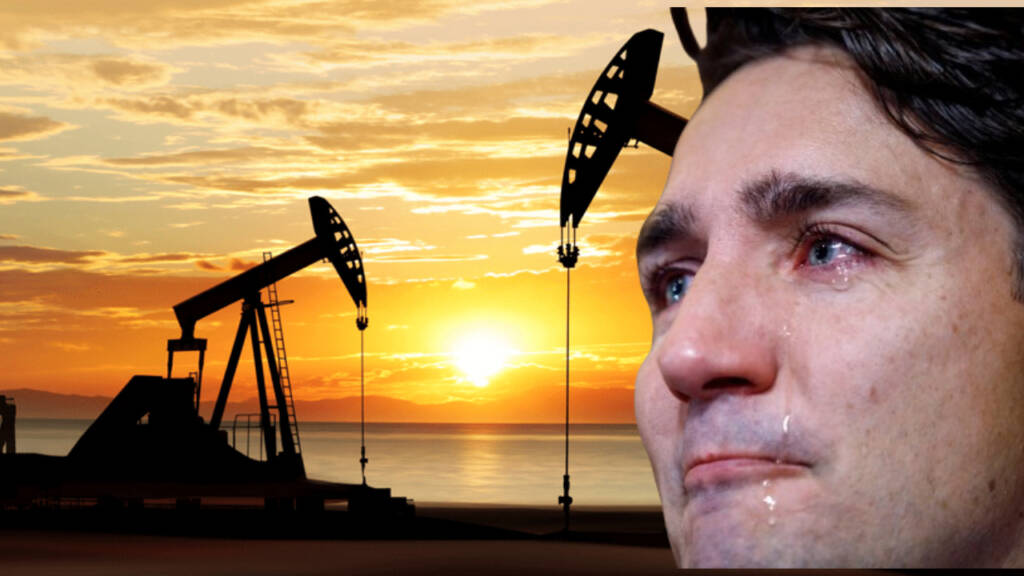Trudeau’s government is really stirring the pot, gunning for tough emission limits in the oil and gas game. But this green shift isn’t just smooth sailing—it’s causing chaos in Canada’s energy scene. While the government’s all about going green, the old-school energy players are taking a hit and here’s the kicker: Canadian oil firms are holding their breath, waiting for Trudeau’s exit instead of rushing to slash emissions faster. Yes, you got that right.
Some Canadian oil and gas producers say they will not rush to accelerate emissions cuts until they see if unpopular Prime Minister Justin Trudeau survives long enough to implement his proposed oil and gas emissions cap.
Join us on Telegram: https://t.me/tfiglobal
This month saw the delayed release of a framework demanding Canadian oil companies slash carbon emissions by as much as 38% from 2019 levels by 2030. However, surveys indicate that the opposition Conservatives, led by Pierre Poilievre and standing against this cap, hold a significant advantage over Trudeau’s Liberals ahead of the anticipated 2025 election. This situation raises the possibility that the proposed emission cap might get shelved.
Read More: Justin Trudeau chokes Canada’s energy sector to crush the Prairies and please Joe Biden
Alberta, Canada’s primary oil-producing province, has pledged to create a “constitutional shield” to protect against this emission cap. Meanwhile, several smaller oil firms are openly pondering whether a potential loss for the Liberals in the 2025 election could circumvent the need for hastened emission reductions. Notably, Canada ranks as the world’s fourth-largest crude producer, with its oil and gas industry representing the nation’s most significant source of emissions, contributing to over a quarter of the country’s total emissions.
According to CEO Jim Evaskevich, Yangarra Resources, currently yielding 12,500 barrels of oil equivalent per day (boe/d), will persist in reducing emissions, provided it remains financially viable or enhances its efficiency through these measures.
“If we get to where we’re having to spend a lot of money to become way more draconian with our reductions, then we’re going to look at the federal election and go, ‘yeah no we’re not spending that money, no way.’ Because our fervent hope is (Trudeau) is gone,” Evaskevich said.
The Canadian Climate Institute notes that due to increased oil and gas production, the sector’s overall emissions have surged by approximately 13% since 2005. Interestingly, while this increase has occurred, the emissions intensity, signifying the carbon emitted per barrel of oil produced, has actually decreased.
A spokesperson from the federal environment ministry emphasized that oil companies should adhere to the emission cap, highlighting that doing so aligns with sensible business practices.
“They are making record profits at a time where affordability and the environment are the two most important issues,” the spokesperson added.
Resistance from smaller and medium-sized producers highlights the divide between the climate policies of the Liberal government, some of which have faced rejection in court, and a sector that holds significant importance for Canada’s economy.
Shannon Stubbs, serving as the Conservative shadow minister for natural resources, criticized the emissions cap, considering it an intrusion of federal authority into provincial jurisdiction.
Tamarack Valley Energy which plans to produce about 62,000 boe/d in 2024, is already reducing methane emissions from gas infrastructure but needs more details about the cap before it can decide if it must cut faster, said CEO Brian Schmidt.
The possibilities of a government change and of courts rejecting the emissions cap mean “nobody’s putting much weight” into the cap yet, including Tamarack, Schmidt said.
Trudeau’s energy cap has become a major headache for oil firms—they’re definitely not on board with it. Some determined provincial leaders, like Alberta’s Danielle Smith, have managed to shield their regions from federal interference. But what about the rest of the country? It’s almost comical—everyone’s holding their breath, waiting for Trudeau’s exit in the upcoming election.
Read More: Danielle Does Dubai, Trudeau Drops the Oil Cap
The Canadian political landscape is in turmoil, with conservatives gaining ground while liberals take a backseat. Canada’s oil and gas sector is practically throwing a party in response. Recently concluded survey by the Angus Reid Institute reveal Trudeau’s Liberals trailing behind the Conservatives by a staggering 17 points, stirring uncertainty about his future as Prime Minister. If recent polls are any indication, the opposition Conservatives seem poised to dethrone the ruling Liberal Party in the next federal elections.
It’s time for the energy sector to pause and reconsider before diving into the Liberals’ policies, especially since they’re seemingly on their way out next year.
Recommended Video:
https://youtu.be/zA2Bps4wYVM?si=MD-gjOg9VyIuERHL
